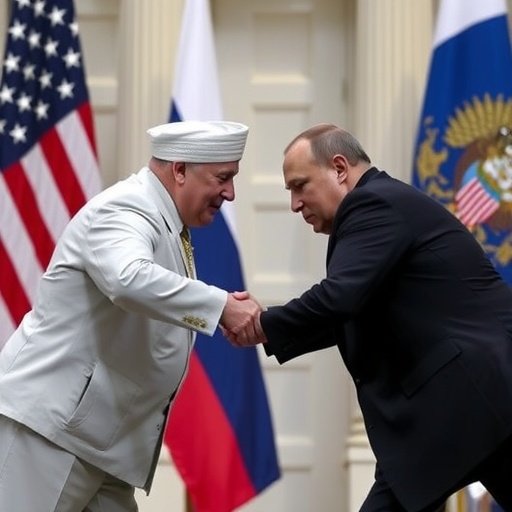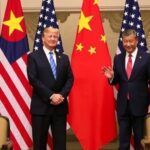U.S. Imposes Harsh New Sanctions on Russia as Diplomatic Tensions Reach Boiling Point
In a bold escalation of U.S. foreign policy toward Russia, the Biden administration unveiled a sweeping package of new Sanctions on Wednesday, targeting key sectors of the Russian economy including its energy giants and financial institutions. This move comes amid heightened diplomatic tensions following Russia’s recent military maneuvers near NATO borders and ongoing disputes over Ukraine, prompting immediate backlash from Moscow and raising questions about the long-term efficacy of such measures in international relations.
- Targeting Russia’s Economic Lifelines: Energy and Finance Hit Hard
- Moscow’s Fiery Retaliation: Expulsions and Counter-Sanctions
- Global Allies Weigh In: NATO’s United Front and China’s Silent Support
- Debating Effectiveness: Do Sanctions Really Change Russian Behavior?
- Looking Ahead: Potential Escalations and Pathways to De-Escalation
The Sanctions, announced by the U.S. Treasury Department, aim to curb Russia’s aggressive foreign policy actions by freezing assets and restricting trade. Officials described the package as a “decisive response” to what they called “unprovoked provocations,” with potential ripple effects on global markets and alliances. As the world watches, these sanctions underscore the fragile state of U.S.-Russia relations, already strained by years of conflict over cybersecurity, election interference, and territorial disputes.
Targeting Russia’s Economic Lifelines: Energy and Finance Hit Hard
The core of the new sanctions focuses on Russia’s energy sector, a cornerstone of its economy that accounts for nearly 40% of federal revenues, according to the International Energy Agency. U.S. officials have blacklisted several major oil and gas companies, including subsidiaries of state-owned Rosneft and Gazprom, prohibiting American firms from engaging in new transactions with them. This includes a ban on importing Russian crude oil and petroleum products, set to take effect in 90 days, which could disrupt supply chains for European allies reliant on Russian exports.
In the financial realm, the sanctions extend to several prominent Russian banks, such as VTB and Sberbank, limiting their access to the SWIFT international payment system. Treasury Secretary Janet Yellen stated in a press briefing, “These measures are designed to isolate Russia’s financial infrastructure from the global economy, sending a clear message that aggressive actions will have severe economic consequences.” The move echoes previous sanctions imposed in 2014 following Russia’s annexation of Crimea, but experts note this round is broader, affecting over 50 entities and individuals linked to the Kremlin.
Statistics from the U.S. State Department highlight the scale: the sanctions could freeze up to $300 billion in Russian assets held in Western banks, building on the $100 billion already immobilized since 2022. This financial squeeze is intended to pressure Russian President Vladimir Putin into reconsidering his foreign policy stance, though historical data suggests mixed results—Russia’s GDP contracted by only 2.1% in 2022 despite earlier penalties, per World Bank figures.
Moscow’s Fiery Retaliation: Expulsions and Counter-Sanctions
Russia wasted no time in responding to the U.S. sanctions, with the Foreign Ministry labeling them “economic warfare” and vowing reciprocal actions. In a televised address, Putin accused the West of hypocrisy, claiming the measures violate international law and will only strengthen Russia’s resolve. “We will not bow to pressure from those who seek to dictate terms to sovereign nations,” he declared, announcing the expulsion of 10 U.S. diplomats from Moscow and restrictions on American NGOs operating in Russia.
Diplomatic tensions have spiked, with Russia recalling its ambassador from Washington for consultations—a move not seen since the height of the Cold War. Counter-sanctions include a ban on exporting rare earth minerals to the U.S., critical for tech and defense industries, and higher tariffs on American agricultural goods. Russian officials also hinted at weaponizing energy supplies, potentially cutting gas flows to Europe during the upcoming winter, exacerbating the ongoing energy crisis that has already driven European natural gas prices up 300% since 2021, according to Eurostat data.
International relations experts point to this tit-for-tat escalation as a dangerous game. “The cycle of sanctions and retaliation risks pushing U.S.-Russia relations into uncharted territory,” said Fiona Hill, a former National Security Council official, in an interview with CNN. “It could lead to miscalculations with global repercussions.”
Global Allies Weigh In: NATO’s United Front and China’s Silent Support
The U.S. sanctions have garnered support from NATO allies, with the European Union quickly aligning by preparing its own parallel measures. UK Prime Minister Rishi Sunak tweeted, “The UK stands shoulder-to-shoulder with our American partners in holding Russia accountable for its destabilizing actions.” Germany and France have pledged to phase out Russian energy imports by 2024, accelerating a shift toward renewables amid the diplomatic tensions.
However, not all international reactions are unified. China, Russia’s closest economic partner, has refrained from criticizing the sanctions, instead offering vague calls for “dialogue in international relations.” Beijing’s trade with Russia surged 30% last year to over $190 billion, per Chinese customs data, providing Moscow a lifeline to circumvent Western restrictions. Indian officials, too, have remained neutral, continuing to purchase discounted Russian oil despite U.S. pressure.
This divided global response highlights the challenges in U.S. foreign policy enforcement. A United Nations report from earlier this year noted that sanctions on Russia have inadvertently boosted ties between Moscow and non-Western powers, with BRICS nations increasing bilateral trade by 15%. “While the U.S. aims to isolate Russia, it’s inadvertently fostering new alliances,” observed analyst Angela Stent from Georgetown University.
Debating Effectiveness: Do Sanctions Really Change Russian Behavior?
As the sanctions take hold, a fierce debate rages over their impact on Russia’s policy decisions. Proponents argue they serve as a vital tool in U.S. foreign policy, deterring further aggression. Historical precedents, like the sanctions that contributed to the Soviet Union’s economic woes in the 1980s, are often cited. The Peterson Institute for International Economics estimates that cumulative sanctions since 2014 have cost Russia up to $100 billion annually in lost revenue.
Critics, however, question their bite. Russian economist Sergey Guriev, now exiled in Paris, told Reuters, “Sanctions hurt ordinary Russians more than the elite, who adapt through smuggling and parallel imports. They’ve unified public opinion against the West rather than pressuring change.” Data from the Russian Central Bank shows inflation at 7.5% and the ruble stabilizing post-initial dips, thanks to capital controls and a pivot to Asian markets.
Within Washington, bipartisan support exists, but concerns linger. Senator Lindsey Graham (R-SC) praised the measures as “necessary to counter Putin’s imperialism,” while Representative Ilhan Omar (D-MN) warned of humanitarian fallout, noting that over 20% of Russians live below the poverty line, per World Bank stats. The sanctions’ role in broader international relations is under scrutiny, with think tanks like the Brookings Institution urging complementary diplomacy to avoid total breakdown.
To illustrate the multifaceted effects, consider these key impacts:
- Economic Strain: Russia’s export revenues could drop by 25%, affecting funding for military operations.
- Humanitarian Concerns: Access to Western medicine and technology may be limited, impacting healthcare.
- Geopolitical Shifts: Increased reliance on Iran and North Korea for arms and resources.
Looking Ahead: Potential Escalations and Pathways to De-Escalation
With diplomatic tensions at a fever pitch, the future of U.S.-Russia relations hangs in the balance. Upcoming NATO summits in Vilnius could see further coordinated sanctions if Russia escalates its military presence in the Black Sea region. Meanwhile, backchannel talks through intermediaries like Turkey suggest glimmers of negotiation, particularly on grain exports vital for global food security amid the Ukraine conflict.
U.S. foreign policy architects emphasize that sanctions are part of a larger strategy, including bolstering Ukraine’s defenses with $61 billion in aid approved last month. Yet, as international relations evolve, experts predict a prolonged standoff. “The sanctions may slow Russia’s ambitions, but without a diplomatic off-ramp, we risk a new era of confrontation,” warned former U.S. Ambassador to Russia Michael McFaul.
Investors and policymakers alike are bracing for volatility. The sanctions could push oil prices above $100 per barrel, per OPEC forecasts, while tech sectors face supply chain disruptions from restricted Russian metals. As the world navigates these choppy waters, the true test will be whether these measures reshape Russia’s behavior or merely entrench divisions in global international relations.








